September 23, 2015
Edited by David Sanders
Specimen Days
965 – Aboe a-Taia-H al-Moetanabbi, Arabic royal poet (Diwan), murdered.
1241 – Snorri Sturluson, Icelandic historian, poet, and politician (b. 1178), dies.
1605 – Daniel von Czepko, German poet, is born.
1605 – Pontus de Tyard, French poet, isborn.
1791 – Karl T Korner, German poet (Zriny, Leyer und Schwerdt), is born.
1896 – Ivar A Aasen, Norwegian linguistic/poet, dies at 83.
1901 – Jaroslav Seifert, Czech poet (Nobel 1984), is born.
1922 – Philip Owen Arnould Sherrard, scholar theologian poet/translator, is born.
1930 – Sehba Akhtar, poet of Pakistan (d. 1996), is born.
1973 – Pablo Neruda, [N R R Basoalto], poet (100 Love Sonnets), dies at 69.
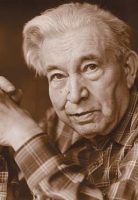
How much is there that man must leave behind
as the train inexorably approaches
Lethe Station
with its plantations of shimmering asphodels
amidst whose perfume everything is forgotten.
Including human love.
That is the final stop:
the train goes no further.
—from "Fragment of a Letter" by Jaroslav Seifert (1901–1986)
“How much is there that man must leave behind / as the train inexorably approaches”—Jaroslav Seifert (1901–1986)
World Poetry
Corbyn Quits Anti-War Group After Queen Poem
His team insists his resignation was planned before the Stop The War Coalition printed an "offensive" poem about the Royal Family. Jeremy Corbyn has resigned as chairman of the Stop The War Coalition, on the day it reprinted a poem accusing the Queen of profiting from conflict. The Labour leader's decision came five hours after the campaigning group published an excerpt of "Royal Babylon: The Criminal Record of the British Monarchy" by poet Heathcote Williams.
Jeremy Corbyn has resigned as chairman of the Stop The War Coalition, after the group eprinted a poem accusing the Queen of profiting from conflict.
Recent Reviews
Wise Love Poems by Mary Oliver, and Two Other New Collections
by Elizabeth Lund

Mary Oliver’s Felicity (Penguin Press, $24.95), forthcoming next month, is a breezy, inviting collection of love poems that celebrates the divine as much as it does the natural world or human relationships. Fans will rejoice that the Pulitzer Prize winner shares bits of wisdom on every page, beginning with the opening lines: “Things take the time they take. Don’t/ worry.” A few poems later, she considers “moments that cry out to be fulfilled” and asserts, “There is nothing more pathetic than caution/ when headlong might save a life,/ even, possibly, your own.” Oliver dives headlong into every subject, whether she’s listening to the trees speak or looking for signs of spring.
Merrill’s Intimations
by David Mason
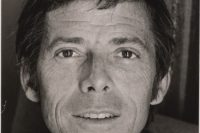
James Merrill (1926–95) was often derided as the Ri¢hie Ri¢h of twentieth-century American poetry. Poets and critics either resented him for being rich, or excused him for the accident of being rich and marveled at what he accomplished, or claimed to admire what he accomplished and secretly resented him for being rich. There’s no one like a poet for pure jealousy of another’s advantage. None of this was Merrill’s fault though he felt the difference acutely all his life and made dignified reparations through his Ingram Merrill Foundation, which supported all kinds of artists, some of them in times of extreme distress.
From Mexico Kidnappings To Eric Garner, Hererra Writes Poetry Of The Moment
by Craig Morgan Teicher
Juan Felipe Herrera is at the top of his game. A writer who is engaged with the most pressing political and social issues of our moment, he believes (judging from his poems) in all kinds of expression, not just the kind that comes most naturally to him. That's a major qualification for his new job, which, after all, is about encouraging literacy and expression amongst Americans. (Plus, check out this video of him from 1973 looking really cool and playing a mean guitar.)
Writing the Black Terrific
by Carmen Giménez Smith
Race is potentially the most salient matter in American discourse, and contemporary poetry has started to get the message. Many poets and critics have been honest about the exclusionary hegemonic lyric position of the late nineties and early twenty-first century, when many aesthetic movements came and went, but very few considered the paradoxical identity of the othered, including the person of color. Texts once excluded from the categories of the lyric or “American poetry” more generally, pigeonholed instead under the umbrella of “multiculturalism,” are now being reread as forces of influence despite a Euro- and U.S.-centric canon. Political crises and systemic racism have forced our aesthetic hands, and our most robust conversations on poetics address the myriad affects of a polyphonic American lyric voice.
Review: A History Of The Unmarried By Stephen S. Mills
by Michael Ernest Sweet
Given that gay marriage has dominated the American political landscape for far too long, it should come as no surprise that somebody has written a book of poems about it all. But A History Of The Unmarried by Stephen S. Mills is not just another book of poetry that takes on marriage equality as its theme. It is that, but a whole lot more. Mills' work is a terrifically rich, timely, and a seductively personal and honest look at what it means to be two men in a loving partnership.
Mary Oliver’s Felicity, forthcoming next month, is a breezy, inviting collection of love poems.
Broadsides
The 'Yi-Fen Chou' Poetry Scandal Goes Beyond ‘Yellowface'
by Jane Hu
My father immigrated to Montreal from China 24 years ago. At five, a first generation immigrant newly arrived in British Columbia, I was promptly placed in an ESL class when I began kindergarten because I didn’t speak any English. More than 20 years later, I’m an English PhD candidate at UC Berkeley. In my life I alternate between my English name, Jane, and my legal Chinese one, Shan-Jie. I list these biographical details first for two reasons: one, because I believe in the truth of the cliché that we rarely match, in person, what we look like on paper. Two, because biographical facts, and their relationship to art and ideas, were at stake in last week’s controversy over the Best American Poetry 2015 anthology.
Unpublished Stevie Smith: Not Waving but Drawing
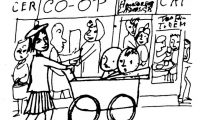
Who or what is Stevie Smith, Ogden Nash once pondered. The poet and novelist who slinked the suburbs of north London has often proved a riddle. Her most famous poem, “Not Waving but Drowning”, turns on a fatal misunderstanding, but she is good at pulling the wool over our eyes. She once characterised writers as shrewd, and the apparently careless lollop of her lines belies an astute technician. A constant in Smith’s career was her determination to include drawings alongside her poems, yet most were omitted from posthumous editions. When I was approached by Faber to edit a new Collected, it seemed a chance to put this right.
Poetry and the Fearful Symmetry
by Daniel Bosch
The setting of the sun has always been legible as a threshold to terror. The world we command in daylight we cede, at night, to danger, to death, and to the spirits of the departed. The sun also rises, yes, but at each day’s anticlimax we know darkness must prevail—for a time—and that we can do but little in the interval. For millennia, at nightfall, we have gathered around what little light we’ve had, while some few of us kept watch, however distractedly. These facts frame all our extended fictions.
A new Stevie Smith collected is due out from Faber, and hopefully it will put the questions that surround the author to rest.
Drafts & Fragments
What's That Line of Poetry Again? Just Yandex It
By Jordan Reed
From April 2014 to March 2015, Russians made 37 million Internet searches for lines of poetry, poems and poets. The Russian Internet giant Yandex put its literary research hat on to conduct a far-reaching survey into the habits of Russians who search for poets and their works online. After analyzing the 37 million Yandex searches related to poetry over the period of one year, April 2014 to March 2015, they put together a kind of snapshot of Russians’ taste in poetry, poems and poets.
From April 2014 to March 2015, Russians made 37 million Internet searches for lines of poetry, poems and poets.
Poetry In the News
C. K. Williams, Poet Who Tackled Moral Issues, Dies at 78

C. K. Williams, whose morally impassioned poems addressing war, poverty and climate change, as well as the imponderable mysteries of the psyche, won him a Pulitzer Prize and a National Book Award, died on Sunday at his home in Hopewell. N.J. He was 78. The cause was multiple myeloma, his wife, Catherine Mauger Williams, said. Mr. Williams first made his mark in the late 1960s with short poems that addressed, in quick, jolting lines, the torments of love and politics. His verse could be, by turns, intensely personal, or public-spirited, taking on the Vietnam War and a long list of social injustices, expressed in hot language. “This is fresh meat right mr nixon?” begins one of his best-known poems, “In the Heart of the Beast,” a response to the fatal shootings of student demonstrators at Kent State University in 1970.
The National Book Awards Longlist: Poetry
Earlier this year, Dan Chiasson described Terrance Hayes as “a poet of swallowed garrulity, imagined riposte, mock correction, and interior litigation.” Today, Hayes is on the longlist for the National Book Award for Poetry. (He won the award in 2010.) He is one of two previous winners on the list: Marilyn Hacker won the National Book Award forty years ago, for her début collection. This year’s list, which includes five women and five men, also features a début poet: Robin Coste Lewis.
C.K. Williams died recently at his home in Hopewell. N.J.
New Books
The Invisible Bridge / El Puente Invisible: Selected Poems of Circe Maia translated by Jesse Lee Kercheval
[Paperback] University of Pittsburgh Press,168 pp., $17.95
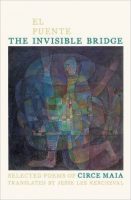
A bilingual collection, The Invisible Bridge/El Puente Invisible gathers the luminous, deeply philosophical poems of Circe Maia, one of the few living poets left of the generation which brought Latin American writing to world prominence.
I Must Be Living Twice: New and Selected Poems 1975 – 2014 by Eileen Myles
[Hardcover] Ecco, 368 pp., $29.99
A collection of thrilling verse, including both new poems and beloved favorites, from the celebrated poet, modern cult icon, and author of Chelsea Girls. Eileen Myles’ work is known for its blend of reality and fiction, the sublime and the ephemeral. Her work opens readers to astonishing new considerations of familiar places, like the East Village in her iconic Chelsea Girls, and invites them into lush—and sometimes horrid—dream worlds, imbuing the landscapes of her writing with the vividness and energy of fantasy.
Bastards of the Reagan Era by Reginald Dwayne Betts
[Paperback] Four Way, 84 pp., $15.95
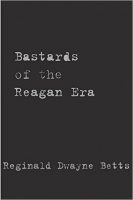
Bastards of the Reagan Era is a challenge, confronting realities that frame an America often made invisible. Within these poems, we see the city as distant lover, we hear “the sound that comes from all / the hurt & want that leads a man to turn his back to the world.” We see that and we see each reason why we return to what pains us.
Fauxhawk by Ben Doller
[Hardcover] Wesleyan,100 pp., $24.95
A politico-linguistic problem, a conflicted hairstyle, and a conflict-bound drone, Fauxhawk works in the space where dissent becomes materialized, ironized, and commodified. Engaging drone optics, redactions, renditions, comedy, and cinema, Ben Doller wrenches exuberant music from the drone of the everyday. The citizens in these poems are fraught in their passivity, both ashamed of being and of being surveyed. Occupied by the material forces conspiring against poetry, Fauxhawk takes on the economics of writing, university bureaucracies, and complicit injustice. The poems in Doller’s thrilling new collection attempt to find their own tone amid the blare via formal innovation, carving a space where presence is signified, in hopeful and clarifying resistance.
Bright Dead Things: Poems by Ada Limón
[Paperback] Milkweed Editions, 128 pp., $16.00
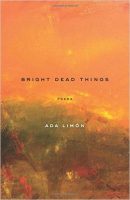
Bright Dead Things examines the chaos that is life, the dangerous thrill of living in a world you know you have to leave one day, and the search to find something that is ultimately “disorderly, and marvelous, and ours.” A book of bravado and introspection, of 21st century feminist swagger and harrowing terror and loss, this fourth collection considers how we build our identities out of place and human contact—tracing in intimate detail the various ways the speaker’s sense of self both shifts and perseveres as she moves from New York City to rural Kentucky, loses a dear parent, ages past the capriciousness of youth, and falls in love.
Bastards of the Reagan Era by Reginald Dwayne Betts is a challenge, confronting realities that frame an America often made invisible.
Correspondences
Interview: Charles Altieri, Professor of Modern Poetry
by Libby Rainey
If literature has any one use, it is chiefly as a means of sharing and experiencing great pleasure. That’s what UC Berkeley professor Charles Altieri would argue, anyway, and he’s not afraid to say it — the scholar of Modernist poetry preaches, examines and enjoys the likes of W.B. Yeats and Wallace Stevens in his courses, sometimes to the miscomprehension and often to the amusement of his students. Altieri walked his dog, Bixby, with The Daily Californian to discuss and uncover some of the joys of his work, discussing some of his favorite poets and poems along the way.
A Q&A with Poet Charles Simic

On Oct. 6, poet Charles Simic will be awarded the Donald Hall-Jane Kenyon Prize in American Poetry. The Monitor’s monthlong celebration of Simic and his work begins with this Q & A, conducted by fellow poet Wes McNair.
You were a young man when you accepted a position on the faculty at UNH, and you’ve lived in New Hampshire ever since. What influence has living in this state had on your development as a poet?
The Rumpus Poetry Book Club chats with Ada Limón
The Rumpus Poetry Book Club chats with Ada Limón about her new book Bright Dead Things, writing love poems in an age of cynicism, committing to places, and the need for a Titleologist. This is an edited transcript of the book club discussion. This Rumpus Book Club interview was edited by Brian Spears.
On Oct. 6, poet Charles Simic will be awarded the Donald Hall-Jane Kenyon Prize in American Poetry.
Envoi: Editor’s Notes
Lessons from the Past: Geoffrey Hill

I would still maintain that a considerable amount of the very unsatisfactory stuff that is being written now is unwitting travesty of the “authentic self.” The particular tone of the unsatisfactory changes from period to period, the unsatisfactory poetry of the age of Pope is not quite the same sort of creature as bad poetry in the age of Tennyson, and bad poetry in the age of Tennyson differs from the bad poetry of the present time. A great deal of the work of the last forty years seems to me to spring from inadequate knowledge and self-knowledge, a naive trust in the unchallengeable authority of the authentic self. But I no longer think that the answer to this lies in the suppression of self; it requires a degree of self-knowledge and self-criticism, which is finally semantic rather than philosophical. The instrument of expression and the instrument of self-knowledge and self-correction is the same. There is a kind of poetry—I think that the seventeenth-century English metaphysicals are the greatest example of this, Donne, Herbert, Vaughan—in which the language seems able to hover above itself in a kind of brooding, contemplative, self-rectifying way. It’s probably true of the very greatest writers. I think it’s true of Dante and Milton, and I think it is true of Wordsworth. It’s a quality that these poets possess supremely. The rest of us, even the very best of us, possess it to a lesser and differing degree, but I cannot conceive poetry of any enduring significance being brought into being without some sense of this double quality that language has when it is taken into the sensuous intelligence, and brought into formal life.
—from "Geoffrey Hill, The Art of Poetry No. 80" The Paris Review, interviewed by Carl Phillips
“Bad poetry in the age of Tennyson differs from the bad poetry of the present time.” —Geoffrey Hill